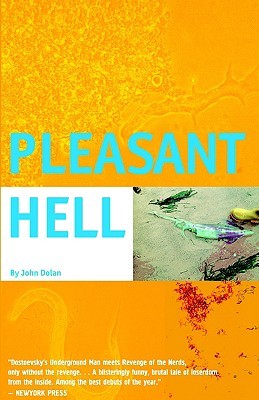
After reading Geoff Cochrane’s book of short stories, White Nights, and John Dolan’s novel, Pleasant Hell, I was puzzled as to why large tracts of Dolan’s prose lodged in my head, while Cochrane’s stories dissolved into the ether. I recall vividly parts of his two novels, Tin Nimbus (about booze and rehab) and Blood (has some graphic writing about sex), and his nine books of poems. But White Nights and, to a lesser extent Brindle Embers (a companion book published two years ago), left in my mind surreal crafted sensibilities, not concrete cargoes.
The stories could be touted as scripts for short films or dream vignettes. Sample from “Passion-Fruit”:
Neville was more a fixture than a feature. His nickel plating had worn off in places, revealing the plumbeous allay beneath. A robot of the historical ZXJ type, he cleared and wiped tables – in pathetic fits and starts.
Jill had her eyes on a babe. Long legs and narrow hips. There he was at the far end of the counter, holding a can of creaming soda and looking woefully cute.
“Do you happen to know his name?” Jill asked the robot.
“Indeed I do, Miss Bradford. Got quite a lunch on him, ain’t he?”
“What can you mean, Neville?”
“Beggin’ your pardon, ma’am, but that young man up yonder is Luke Raven, the painter and musician.”
Many of the pieces work this way and I sense Cochrane’s having spoofy fun timing language with the same watchmaker precision he assigns his poetry: “Screening on dismal Sundays, Psycho and Dr Strangelove. Smoking de rigueur in stalls and dress circle.”
And there’s those old anxiety dreams as in Fade Out: “Cut to a colourful bar . . . How am I to pay for the bourbon and Coke in my hand, and should I be ingesting alcohol at all, given my many past failures and despairs, despairs and failures? . . . Dissolve to a muggy grey elsewhere. I wander, in a floaty sort of way. I ooze or tend miasmally in this direction and that . . . ”
White Nights and Brindle Embers, handsomely produced by Gerald Melling’s Thumprint Press, are important little books in Cochrane’s oeuvre. I would like to see him have a crack at writing a full-length film or stage play.
Poet John Dolan, an American living here, begins his unique, well-written debut novel, Pleasant Hell, in coastal gun-emplacements in Dunedin “firing back at where I came from, little exploding noises out the side of my mouth.” Dolan was “imported” from the USA to teach English 124, a compulsory communication course for medical students. If they don’t get an A in his course they don’t get to go on to the second year of med school. “They hate it. They hate me,” he says. Some of the students produced a T-shirt with an unflattering caricature of Dolan with the words “Blah Blah Blah” beneath it.
He then transports us back to Pleasant Hill, California, in the early 1970s. The young John Dolan was a socially inept nerd. “I was sullen and foul-tempered with my parents as I was cowardly and groveling at school,” he says. The (autobiographical?) novel ends without redemption in a San Francisco State University dormitory. Dolan is studying Russian at Berkeley and is visiting, with a lesbian couple (his only friends) another lesbian couple, who live in the dorm. He smells of Vick’s-Vap-O-Rub, which he stupidly put under his arms, and blood and puss from sores on his neglected feet (to his horror) leaks from one of his boots on to their bedroom carpet.
Earlier in the chapter he says, “I was just the loser, sitting there and taking it, storing up grief-in-advance that would be converted metabolically to fat and bile.” Dolan lays on disgust and self loathing with a trowel, although from him somehow it doesn’t seem excessive. But perhaps the accolade on the back cover attributed to Edward Limonov, Leader of the National Bolshevik Party of Russia – “If Houellebecq’s books are full of stinking death, Pleasant Hell is full of ecstatical life. Glory, glory to Master Dolan! Glory to life!” – was a little over the top.